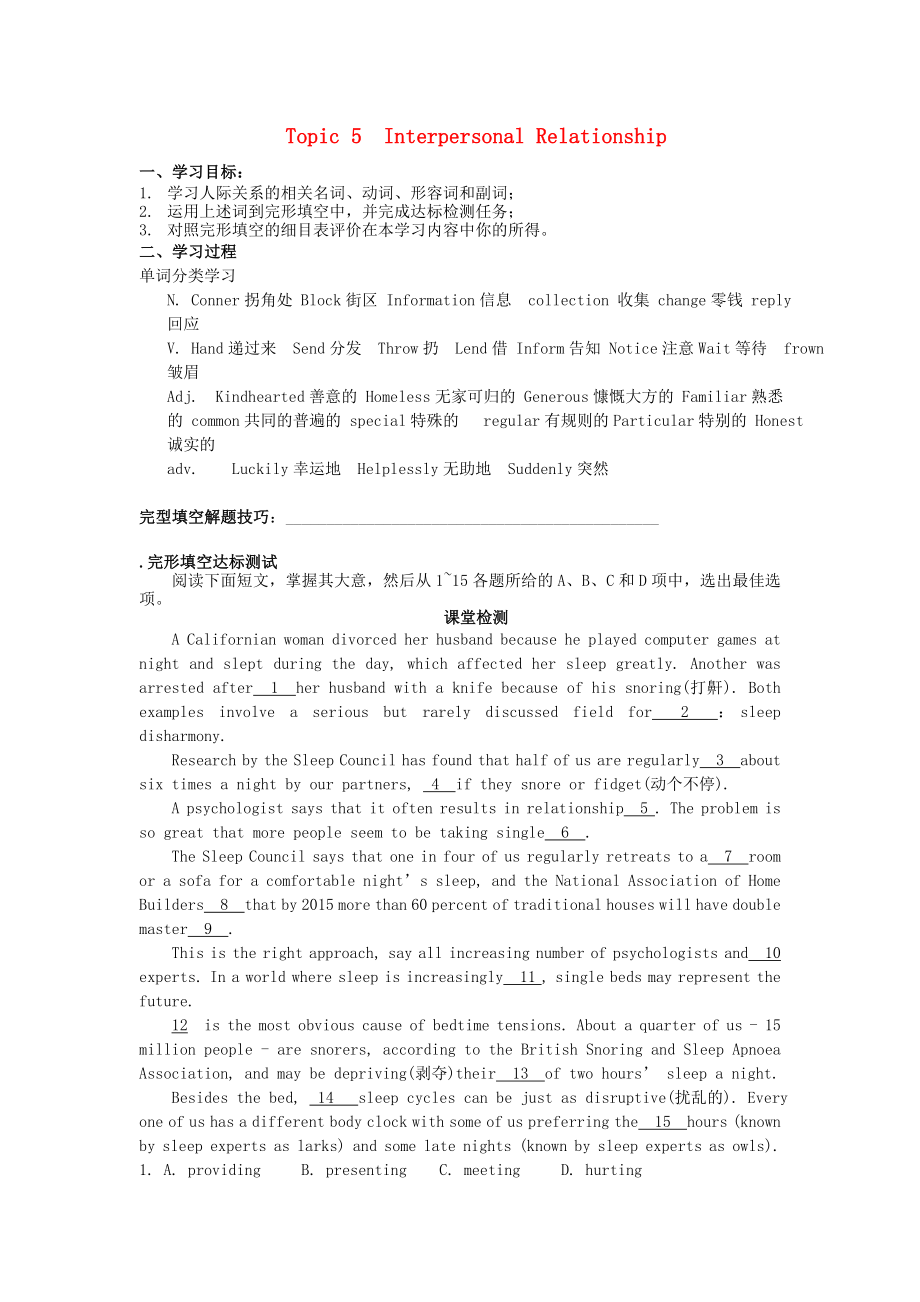《2015年高考英語 話題式精析完型填空解題技巧和解題方法 Topic5 Interpersonal Relationships學案》由會員分享,可在線閱讀����,更多相關《2015年高考英語 話題式精析完型填空解題技巧和解題方法 Topic5 Interpersonal Relationships學案(2頁珍藏版)》請在裝配圖網(wǎng)上搜索。
1��、 Topic 5 Interpersonal Relationship
一��、學習目標:
1. 學習人際關系的相關名詞��、動詞���、形容詞和副詞�����;
2. 運用上述詞到完形填空中�����,并完成達標檢測任務�;
3. 對照完形填空的細目表評價在本學習內(nèi)容中你的所得。
二�、學習過程
單詞分類學習
N. Conner拐角處 Block街區(qū) Information信息 collection 收集 change零錢 reply 回應
V. Hand遞過來 Send分發(fā) Throw扔 Lend借 Inform告知 Notice注意Wait等待 frown 皺眉
Adj. Kindhear
2、ted善意的 Homeless無家可歸的 Generous慷慨大方的 Familiar熟悉的 common共同的普遍的 special特殊的 regular有規(guī)則的Particular特別的 Honest誠實的
adv. Luckily幸運地 Helplessly無助地 Suddenly突然
完型填空解題技巧:______________________________________________
.完形填空達標測試
閱讀下面短文�����,掌握其大意���,然后從1~15各題所給的A����、B�����、C和D項中�����,選出最佳選項�。
課堂檢測
A Californian woman
3���、divorced her husband because he played computer games at night and slept during the day, which affected her sleep greatly. Another was arrested after 1 her husband with a knife because of his snoring(打鼾). Both examples involve a serious but rarely discussed field for 2 :sleep disharmony.
Resear
4�����、ch by the Sleep Council has found that half of us are regularly 3 about six times a night by our partners, 4 if they snore or fidget(動個不停).
A psychologist says that it often results in relationship 5 . The problem is so great that more people seem to be taking single 6 .
The Sleep Council
5�����、 says that one in four of us regularly retreats to a 7 room or a sofa for a comfortable night’s sleep, and the National Association of Home Builders 8 that by 2015 more than 60 percent of traditional houses will have double master 9 .
This is the right approach, say all increasing number of p
6����、sychologists and 10 experts. In a world where sleep is increasingly 11 , single beds may represent the future.
12 is the most obvious cause of bedtime tensions. About a quarter of us - 15 million people - are snorers, according to the British Snoring and Sleep Apnoea Association, and may be dep
7、riving(剝奪)their 13 of two hours’ sleep a night.
Besides the bed, 14 sleep cycles can be just as disruptive(擾亂的). Every one of us has a different body clock with some of us preferring the 15 hours (known by sleep experts as larks) and some late nights (known by sleep experts as owls).
1. A.
8����、providing B. presenting C. meeting D. hurting
2. A. wives B. husbands C. families D. couples
3. A. eared B. hurt C. woken D. shaken
4. A. generally B. Particularly C. occasionally D. actually
5. A. disharmony B. disappearance C. agr
9、eement D. disagreement
6. A. beds B. rooms C. quilts D. meals
7. A. lonely B. spare C. big D. small
8. A. predicts B. insists C. means D. realizes
9. A. kitchens B. toilets C. studies D. bedrooms
10. A. rest
10����、 B. sleep C. marriage D. family
11. A. expensive B. Valuable C. precious D. worthy
12. A. Snoring B. Sleeping C. Sneezing D. Dreaming
13. A. friends B. enemies C. partners D. children
14. A. similar B. regular C. different D. stri
11、ct
15. A. morning B. afternoon C. late D. early�����、
解題技巧目標達成
題型
考查內(nèi)容
題練/題號
首句提醒
原詞再現(xiàn)/復現(xiàn)/上下義
上下文語境
邏輯推理
目標達成
分值比例
完形
填空
名詞詞義辨析
5個:2.5.6.9.13
?
30
動詞詞義(短語)辨析
5個:1.3.8.10.12
?
?
形容詞詞義辨析
4個:7.11.14.15
?
?
副詞詞義辨析
1個4
?
六�、話題詞匯目標檢測(默寫)
? N.
? 敵人
? 不和諧
? 消失
? 夫妻
? V.
? 打鼾
? 打噴嚏
? 預測
? 堅持
? 意識到 實現(xiàn)
?
? Adj.
? 值得的
? 孤單的
? 多余的 空閑的
? 相似的
? 有規(guī)律的
? 嚴格的
? 醒來的
? 珍貴的
?
? Adv.
? 偶爾地
? 特別地
? 總體上
 2015年高考英語 話題式精析完型填空解題技巧和解題方法 Topic5 Interpersonal Relationships學案
2015年高考英語 話題式精析完型填空解題技巧和解題方法 Topic5 Interpersonal Relationships學案

